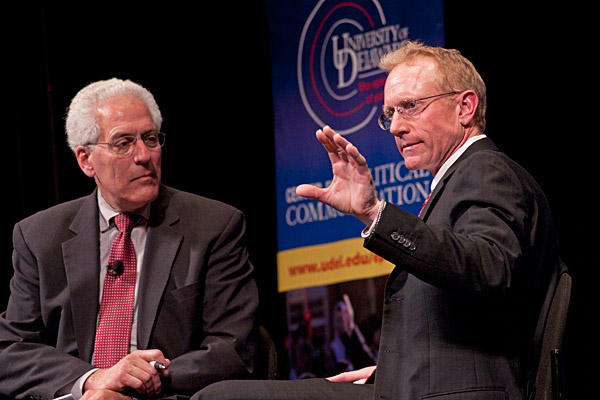
Global Agenda: Red Cell
Intelligence analyst describes his role as 'devil's advocate' in the CIA
3:43 p.m., April 5, 2012--CIA employees pilot drones and gather surveillance on known enemies, but some spend large portions of their days reading through emails. Thousands per day, to be more precise, according to one analyst in the agency.
Eric Anderson described his large inbox and other aspects of his career to an audience in Mitchell Hall on Wednesday, April 4, as part of the Global Agenda speaker series.
People Stories
'Resilience Engineering'
Reviresco June run
Video of the presentation is available at this website.
As an analyst in a Red Cell unit of the CIA, Anderson said he works to come up with ideas that take different positions than his counterparts, examining data and predicting scenarios others do not foresee.
“We challenge the conventional wisdom,” Anderson said of the Red Cell unit.
Anderson said Red Cell units were created in response to past intelligence failures. He described two of the most recognizable examples, one from more than 70 years ago and one from only a little more than a decade ago.
Anderson said in late November of 1941, the United States had “scattered and ambiguous” intelligence that the Japanese were plotting an attack in the Pacific. A minority of individuals believed Hawaii was a target, with supporting evidence including the disappearance of Japanese aircraft carriers from American radar. The Pearl Harbor attack devastated the U.S. less than one month later.
Sixty years later, American intelligence would fail again. Anderson said the 9/11 commission report cited estimates from as far back as 1995 stating the U.S. and its major symbolic landmarks faced threats from abroad.
He said presidential memos between 1998 and 2001 detailed the prevailing threat Osama bin Laden and his allies posed to the U.S., including one memo saying he was threatening attack with an aircraft.
American intelligence agencies, Anderson said, used to operate with the idea that information only needed to be divulged on a “need to know” basis. Since 9/11, the agencies have enacted a “need to share” policy, resulting in a flood of information for analysts.
“Technology is drowning me,” Anderson said.
Anderson said he predicts the need to share policies will eventually go away, but their disappearance will not be a result of analyst’s fatigue. Rather, he said the prevalence of groups like Wikileaks will force the agencies to disseminate less information in order to protect confidentiality.
Analysts tend to face strong backlash, Anderson said, because they generally illuminate harsh realities political leaders and policy makers do not want to know about. They also usually are the ones tasked with describing failures within national security or defense.
“We are ignored in peace and blamed in war,” Anderson said.
Anderson said that while plenty of people in the agency work on terrorism, he personally does not deal with that issue. He said he believes the United States focuses too much on terrorism and not enough on other threats, such as economic ones from places like China and Africa.
He said he spent six months working on the Arab Spring, analyzing different potential scenarios for the government turnovers in those countries. He said the U.S. intelligence agencies learned a lot from the Arab Spring, particularly through the realization of how powerful the Internet could be in mobilizing individuals.
Anderson said the CIA as a whole faces challenges, some stemming from its own size and complexity. There are many separate agencies within the intelligence community, he said, and many times they do not communicate and instead end up working separately on the same tasks.
He said he foresees the intelligence community will eventually downsize and the issues arising from its complexity will be mitigated. That does not mean that the agency can be perfect, he said.
“You will miss things and there will always be failures in the intelligence community because there are humans working in it,” Anderson said, “We are not machines.”
About Global Agenda
The theme of the spring Global Agenda series is "Spies, Lies and Sneaky Guys: Espionage and Intelligence in the Digital Age."
Global Agenda is presented by the Institute for Global Studies, the Department of Communication, the Department of Political Science and International Relations and the Center for Political Communication.
Talks are moderated by Ralph Begleiter, director of the Center for Political Communication.
Presentations are held at 7:30 p.m., Wednesdays, in Mitchell Hall and are free and open to the public.
The series will continue on April 11 with "Cyber Security: Grappling with the Risk," featuring Melissa Hathaway, who served both the Obama and Bush administrations as a leader in understanding cybersecurity. She worked in the office of the director of National Intelligence and on the White House National Security Council staff, where she created a new Cyber Security office. She launched the Comprehensive National Cybersecurity Initiative in both presidential administrations.
Article by Lauren Pitruzzello
Photos by Duane Perry








